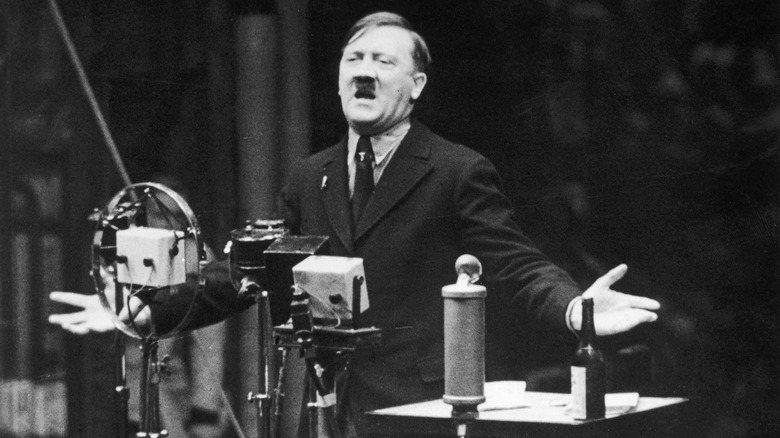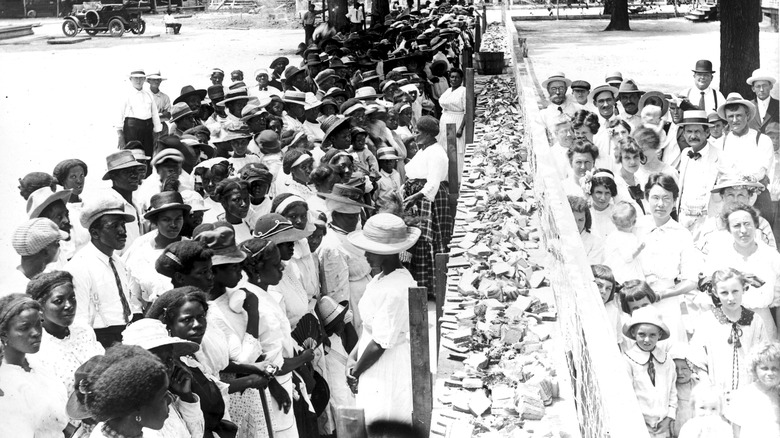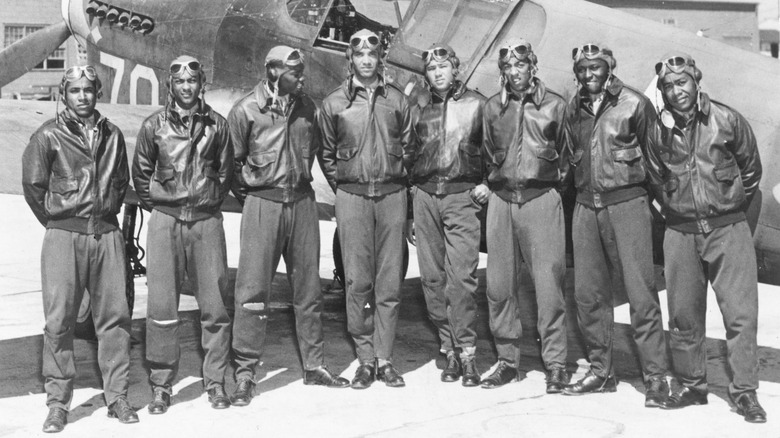The Chilling Connection Germany Had With These United States Laws During WWII
When we're taught history lessons in school, the earth shattering events of World War II are often framed as a battle between forces of freedom and goodness and those of oppression and evil. Adolf Hitler's Third Reich, which came to power in 1933, quickly snuffed out any sense of German democracy that had emerged in the Weimar Republic after World War I. After the passing of the Enabling Act, which gave Hitler and the Nazi Party ultimate control over Germany and its people, the nation's transformation into a fascist state was almost immediate.
Alongside their push to permanently consolidate political power in their own hands, the Nazis sought to transform German society into Hitler's vision of a "pure" Aryan race, which meant the subjugation of disparate ethnicities — especially the country's large Jewish population. What began incrementally with a number of minor policies quickly expanded into a rolling program of mass death — the Holocaust, which took the lives of six million Jewish victims before the Nazis were defeated by the Allied forces in 1945. But the enactment of policies against German Jews — some of the worst crimes Hitler ever committed — was not without precedent. At the same time as the Nazi Party was rising to power, another major force was imposing systemic racial oppression on its own people: the United States. And it was to this country the Nazis turned in search of a guide to fulfill their own inhumane plans.
The Jim Crow laws that inspired the Nazis
The practice of slavery in the United States finally began to diminish in 1863 when Abraham Lincoln's emancipation proclamation came into effect, and a ban on slavery was written into the constitution through the 13th Amendment of the United States Constitution in 1865. However, equality between races in the United States would remain an elusive dream for Black Americans and their allies for generations. Systemic segregation soon existed in almost all walks of life, in part due to the Jim Crow laws that were enacted at the end of the century after the Reconstruction Act of 1867. The groundbreaking legislation gave Black Americans new political powers — and unleashed a wave of reactionary white supremacy in the Southern states.
Named after a minstrel character of an enslaved person that was usually portrayed in blackface, Jim Crow laws prevented Black people from voting, limited the type of jobs they could take on, and curtailed their education opportunities. Public parks were out of bounds for Black people in many states, and they were forced to use separate bathrooms, fountains, cemeteries, elevators, and waiting rooms, segregating them white citizens. A legal system operated often by ex-Confederate sympathizers saw many Black Americans unjustly targeted and sent to work camps. The laws continued in the United States into the 1960s, when they were finally repealed thanks to the achievements of the civil rights movement.
A blueprint for discrimination
To senior members of the Nazi Party in the 1930s, the suppression of Black Americans through Jim Crow laws in the 1930s was a source of inspiration. In 1935, Germany passed the Nuremberg Laws, its first pieces of legal aggression against the country's Jewish population that over the next decade would lead to mass genocide. Jim Crow banned interracial marriages in the United States, and the Nazis saw this element of American race law as an ideal first step in distinguishing between Jewish and Aryan citizens.
The Nazis also looked at how the U.S. had failed to endow Native Americans with citizenship, and how races were defined in the young country — many U.S. states used the "one-drop" rule to define anyone with even a distant trace of Black heritage, or a "drop of Black blood," to be legally non-white. Under the influence of such openly discriminatory legislation across the Atlantic, the Nazis similarly defined Jews by their ancestry, and took citizenship away from any person with three or more Jewish grandparents.
Black Americans fought on two fronts
When the United States entered World War II in December 1941, Black Americans found themselves called upon to fight oppression abroad while experiencing it at home. Indeed, the military that now called for Black recruits was segregated at the outbreak of war, with conscripts serving in all-Black divisions or made to work menial jobs. Soon after, Black activists led by trade unionist A. Philip Randolph called for a march on Washington and widespread civil disobedience to put an end to employment discrimination and segregation in the armed forces. Their activism led to Executive Order 8802, which outlawed discriminatory practices in both the military and government.
At the same time, the Double V Campaign called on Black Americans to give their all to the war effort on the proviso that the U.S. government make decisive steps to ensure greater equality at home, per PBS. Based on a letter published in the Pittsburgh Courier by 26-year-old James G. Thompson, the campaign saw Black Americans fighting for a double victory on both sides of the Atlantic. "Democracy At Home Abroad," the Courier demanded, claiming "this slogan represents the true battle cry of colored America." The effort provided an effective mouthpiece for Black Americans who bravely contributed to the war effort, and laid the groundwork for the civil rights movement that would continue to fight for equality in America long after fascism in Germany had been defeated.
[Image via Wikimedia Commons | Cropped and scaled]



